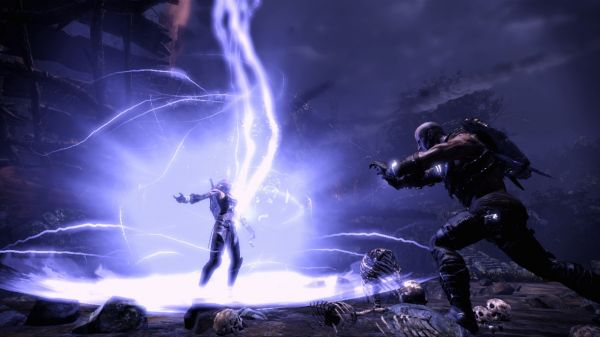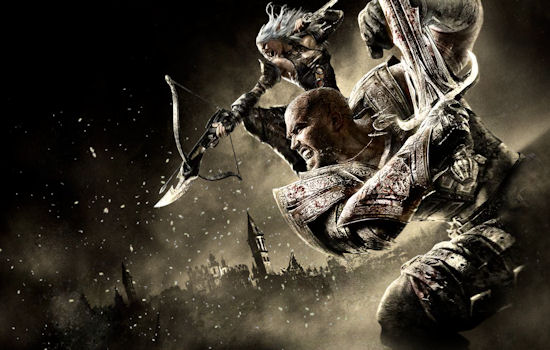It's been sometime since Hunted: The Demon's Forge was announced, but right from the get go the game intrigued us. After getting our hands on the game at E3 for some good ol' co-op action, we were quite impressed. With an expected Spring 2011 release for the game, there's still some time to go - but we got a chance to ask some burning questions on the title.
First we chatted with Brian Fargo, CEO of inXile Entertainment, and creator of such classic games as The Bard's Tale, Wasteland and other Interplay titles.
Co-Optimus: Your career has spanned a multitude of games, such as Bard’s Tale, Fallout, and Baldur’s Gate, that have helped define the “Western RPG” experience, though these games also focused on a single-player experience. What lead to this change from solo to co-operative gaming?
Brian: A number of things affect the way my teams and I have approached the games we’ve worked on. Technology and gamers’ tastes are the primary motivators for how we view things. The internet didn't really exist in a commercial form back in those days so people were not wired into a community like they are now.
The social aspects of gaming are incredibly strong. And my original roots go back to playing Dungeons and Dragons which was always centered on a social situation. If you want to continue to be relevant in an entertainment medium you need to recognize the dynamics of the current trends - and then blend them into the way you want people to feel about the experience.
Co-Optimus: Those games are also well known for their characters and humor. Will Hunted also have some of that same light-heartedness and depth of character?
Brian: Two things that are timeless are good writing and character development. These two elements are something that we really work at achieving when creating a game. Good writing comes from creating good characters and from an understanding of the situations from a real world perspective.
The best writing is when the player thinks it is something he would have said or when the characters react realistically to situations. The more in tune you are with your game the better the writing becomes. Our writing comes both from our own personalities and from how we feel we would react should we find ourselves in those situations.
Co-Optimus: As someone who’s been in the games industry for some time, what’s your take on the increase in co-operative games that we’ve seen over the past couple of years? Do you think the kind of social interaction MMOs and gaming communities have afforded gamers has been an influence on this, or do you think there have been other contributing factors?
Brian: Having avatars on Xbox Live or profiles on Facebook are the strongest movements towards an increase in cooperative play. Playing games with your friends is always more enjoyable whether it is as your real self or as an avatar that represents you.
The dynamic is far different with something like a PSN or Xbox Live than just having a straight internet connection with peer to peer playing.

Co-Optimus: You stated in an interview with IGN that, as a dungeon crawler, you wanted Hunted to be “something where it's a sensory experience,” as opposed to the kinds of experiences you get with jRPGs or Mass Effect. Could you describe that a bit more? Is this experience related to the puzzles that players can solve in addition to fighting off hordes of terrible beasties?
Brian: If we go back to the original games of Wizardry, Stonekeep, or even Hexen, they all worked on capturing the experience of crawling around in a dungeon, finding secret doors and battling through hordes of monsters while avoiding traps. Some of these games were straight up RPG while others were more action-oriented games. As good as the graphics were at that time, you really needed to stretch your imagination in order to have them feel real. They certainly didn't hold up to the animation you’d see in a movie for example.But here in the year 2010, the hardware has gotten so powerful that you don't have to suspend your disbelief as much because things look incredible on the game consoles. This is what I mean by bringing the essence of the dungeon crawl back.
With Hunted, we could have taken a hardcore RPG, but we decided it should be more action oriented. That being said, we did decide to create experiences, such as the game’s puzzles, that are off the critical path – that bring more depth to the experience. We’re able to make as many puzzles as we want and we can make them as difficult as we want because we don't force the players to complete them in order to have fun playing the main quest.
